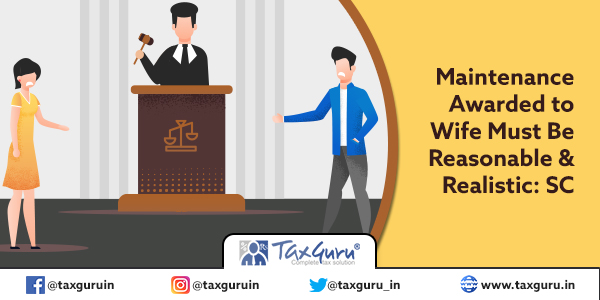The Supreme Court held that Maintenance Awarded Must Be Reasonable and Realistic
The Supreme Court had stated that the main purpose of granting temporary/permanent alimony or maintenance is to make sure that the dependant partner is not reduced to destitution or homelessness because of the failure of the marriage, and not as a punishment to the other partner.
The amount of maintenance awarded should be reasonable and realistic and must avoid either of the two extremes that is, maintenance awarded to the wife must not be so excessive which becomes unfair and unbearable for the husband, on the other hand, it must not be so insufficient that it drives the wife to destitution. The judge’s bench comprising Justices Indu Malhotra and R. Subhash Reddy had observed this judgment which was delivered on Wednesday [RAJNESH vs. NEHA].

The Court also held that there is a propensity on the part of the wife to overstate her requirements, and there is a corresponding propensity by the husband to hide his actual earnings. In order to make an objective valuation for grant of interim maintenance, the bench had also stated that Affidavit of Disclosure of Assets and Liabilities must be filed by both parties in all maintenance trials, which includes pending trials before the respective Family Court or District Court or Magistrates Court.
The court observed that the aspects which would consider with the Court among others are the status of the parties; reasonable requirements of the wife and dependent children; whether the claimant is educated and professionally competent; whether the claimant has any independent source of earning; whether the earning is adequate to empower her to maintain the same standard of living as she was familiar to in her matrimonial home; whether the claimant was working prior to her marriage; whether she was employed during the existence of the marriage; whether the wife had to sacrifice her service opportunities for taking care of the family, child-rearing, and looking after adult members of the family; judicious costs of litigation for a non-employed wife.
It also stated that the monetary capacity of the husband, his actual earning, reasonable expenditures for his own maintenance, and dependant family members whom the husband is obliged towards maintaining under the law, liabilities if any, shall be required to be taken into consideration, to reach at the suitable quantum of maintenance to be compensated.
The court stated that the concerned courts must take into account the following standards for determining the amount of maintenance payable to the claimant.
On termination of the marital relationship, if the wife is educated and professionally competent, but she had to give away her service opportunities to look after the requirements of the family to take care of the minor children, and the elderly members of the family, this factor must be given due importance. This is of specific relevance in present-day society, given the highly competitive business standards, the separated wife shall be required to experience fresh training to obtain marketable skills and re-train herself to get a job in the paid workforce in order to rehabilitate herself. With the development of age, it would be hard for a dependant wife to make an easy entry into employment after a break of many years.
Even though passing a residence order under the Domestic Violence Act, the Magistrate might direct the defendant to pay the rent as well as any other payments, considering the financial requirements and resources of the parties.
If the wife is employed, it cannot work as a bar from being awarded maintenance through the husband.
The Court had to regulate whether the earning of the wife is adequate to maintain herself, consistent with the lifestyle of her husband in the matrimonial house. An able-bodied husband is be alleged to be competent in earning sufficient money to maintain his wife as well as a kid, and cannot oppose that he is not in a place to earn satisfactorily to maintain his family.
The responsibility is on the husband towards establishing with necessary material that there are enough grounds to show that he is incapable to maintain the family and release his legal responsibilities for reasons beyond his control. If the husband doesn’t unveil the exact sum of his earning, an adverse implication might be drawn by the Court.
The living expenditures of the child shall include costs for food, clothing, house, medical expenditures, education of kids. Also, additional coaching classes or any added vocational training courses in order to complement the basic education should be factored in, when awarding child support. Although, it must be a reasonable sum to be awarded for extra-curricular or coaching classes and not an excessively excessive sum which might be claimed. The education expenditures of the children should be normally taken care of by the father. If the wife is employed and earning satisfactorily, the expenditures might be shared uniformly between the parties.
However, serious disability or ill health of a partner, child/children from the marriage/dependant relative who needs constant care and regular expenditure, shall also be a relevant consideration while counting maintenance.
The Court held that, though there is no limitation to seek maintenance both under the D.V. Act as well as Section 125 of the Cr.P.C, it would be unfair to direct the husband towards paying maintenance under each of the trials, independent of the relief granted in a previous trial. In deciding the amount of maintenance in the subsequent trial, the civil court/family court shall take into consideration the maintenance awarded in any formerly instituted trial and determine the maintenance payable towards the applicant. The Court also stated that the right to claim maintenance under every enactment should date back to the date of filing the application.
*****
eStartIndia is the professional tech-based online business and legal services providing a platform that helps the clients to simplify the procedures of all kinds of registration, implementation, tax concerns, and any other compliance and services related to the business in India.





